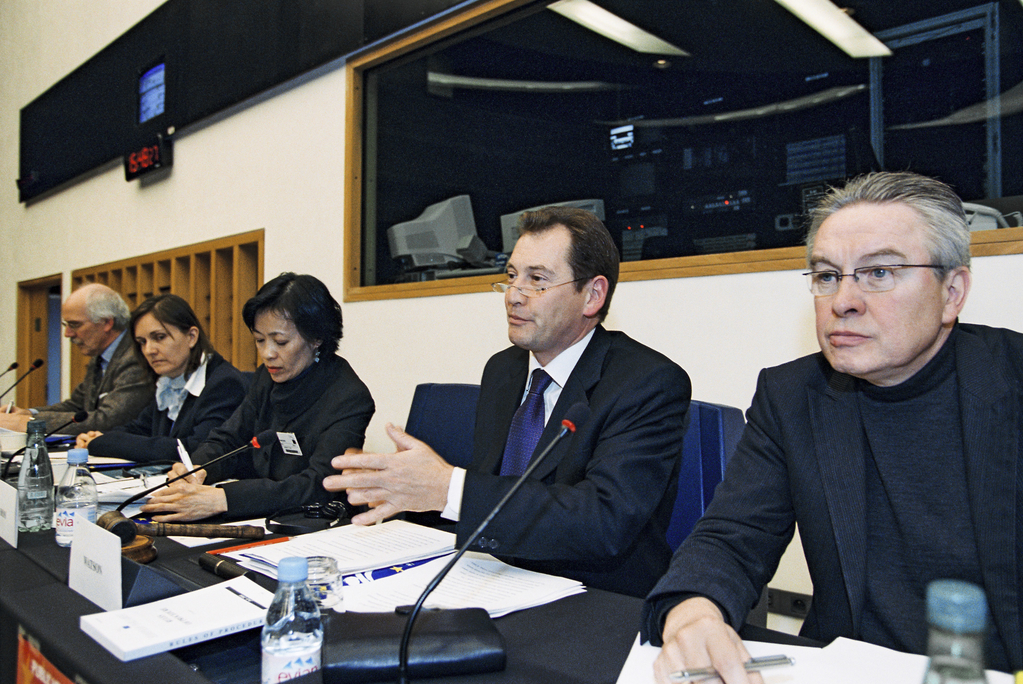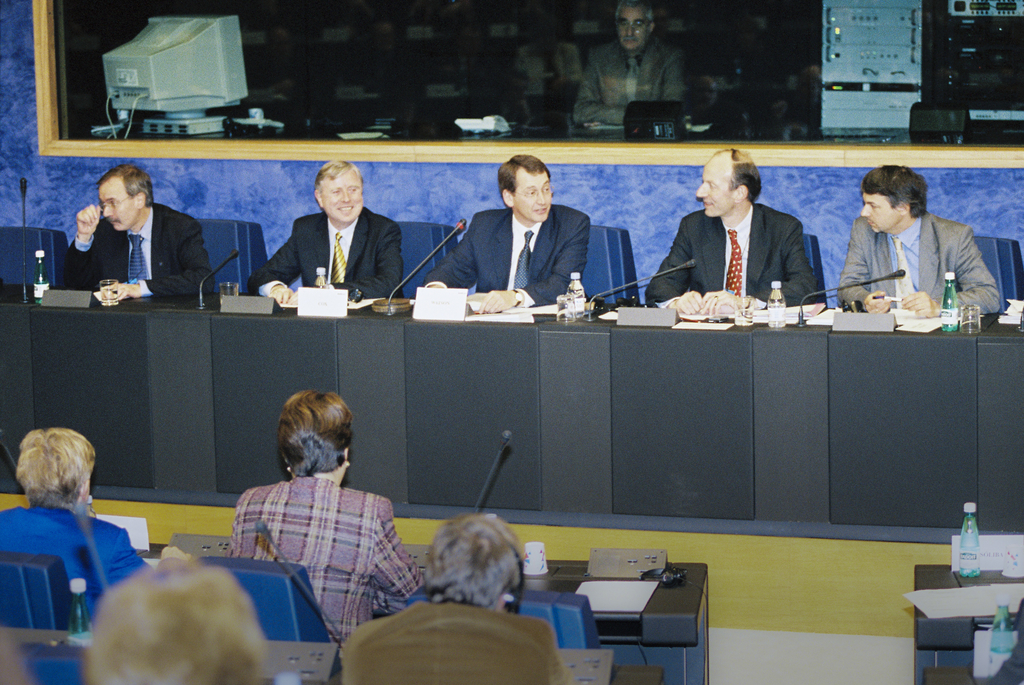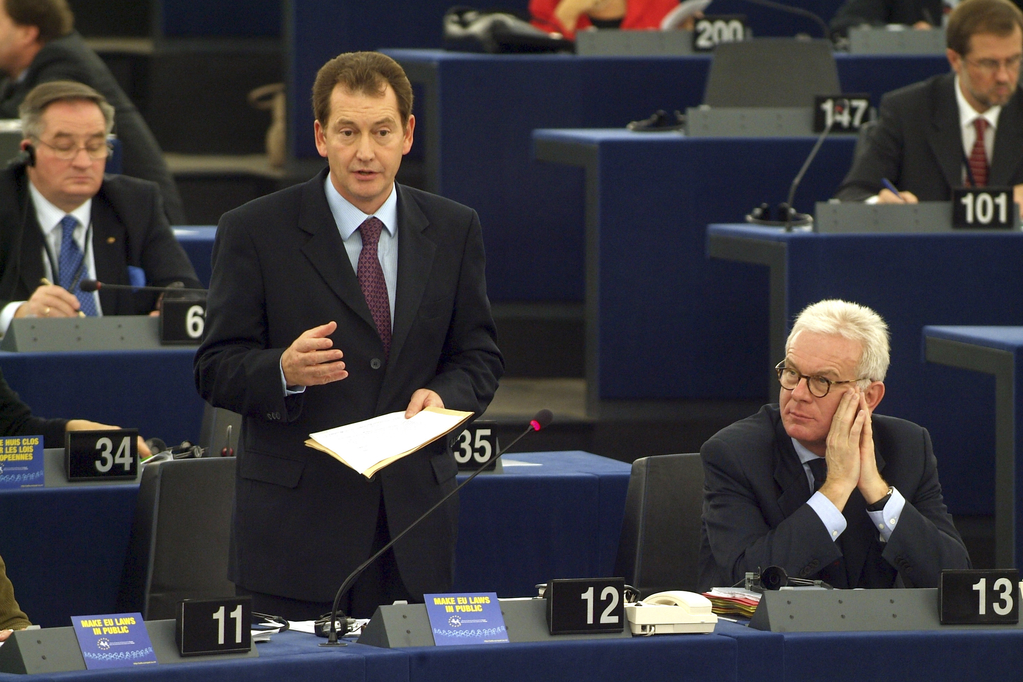Political groups
1994-2004: Group of the European Liberal, Democrat and Reform Party
2004-2014: Group of the Alliance of Liberals and Democrats for Europe
National parties
1994-2014: Liberal Democrats
Biography
Sir Graham Robert Watson was born in Rothesay on the island of Bute in Scotland. After attending school in Bath, he returned to Scotland to study contemporary literature at Heriot-Watt University, graduating in 1979. He began working as a freelance translator, before developing managerial skills his in a position at the University of Technology of Paisley between 1980 and 1983.
Watson began his political career in 1972, first joining the National League of Young Liberals before becoming a member of the Scottish Young Liberals and the Scottish Liberal Party. He had the opportunity to engage politically at international level by joining the Office of the International Liberal Youth Federation, which he would become the Vice-President of in 1977 and the Secretary General of in 1979. This engagement enabled him to set up the Youth Forum of the European Communities. Between 1983 and 1993, Watson became a member of the Council of the Liberal Democratic Party and European Reform Party. From 1983 to 1987, he was also head of the private office of Sir David Steel, who was the leader of the UK Liberal Party at that time.
In 1988 he worked for Hong Kong & Shanghai Banking Corporation (HSBC) in London and Hong Kong. As part of his missions, he collaborated with the European Bank for Reconstruction and Development, which increased his interest in the Far East and motivated him to learn Mandarin Chinese in order to become an advisor to the Asia-Pacific Public Affairs Forum in 2007.
 Public Hearing: China and the EU arms embargo: Time to lift the embargo? Graham Watson, Dirk Sterckx © European Union 2005 - European Parliament
Public Hearing: China and the EU arms embargo: Time to lift the embargo? Graham Watson, Dirk Sterckx © European Union 2005 - European Parliament
Graham Watson was appointed as Chevalier at the Honneurs’ Ceremony for the Anniversary of the Queen on 11 June 2011 for political services. He is also holds the honours of the Republic of China, Georgia and Gibraltar. In 2016, in the campaign for the Brexit referendum, he became the leader in his region in favour of the “Remain” campaign.
European activity
In the 1994 European Parliament elections, he was elected the representative of the Somerset and Northern Devon regions with a majority of more than 22,500 votes. Graham Watson became the first Liberal Democrat member representing a British constituency in the European Parliament. This group included the parliamentary political group of the European Liberal, Democrats and Reform Party (ELDR) group, which itself was represented in two committees: the Committee on Economic, Monetary and Industrial Policy and the Committee on Budgets. He was also an alternate member of the Committee on Employment and Social Affairs. By becoming a member of the Delegation for relations with Japan, he used his knowledge of the Far East to his advantage.
Graham Watson was then re-elected into a new constituency as the only Liberal Democrat member in the 1999 European elections. During his term of office, he headed the UK Liberal Democrats’ Section in Parliament and between 1999 and 2002, he chaired the Committee on Citizens’ Freedoms and Rights, Justice and Home Affairs. During that term, he also succeeded Pat Cox as President of the European Liberal Democrat and Reform Party (ELDR) group between 2002 and 2004. He also continued to work as a member of the Delegation for relations with Japan and of the Committee on Economic and Monetary Affairs and Industrial Policy. He was also an alternate member of the Committee on Regional Policy, Transport and Tourism. He was the Editor-in-Chief of the periodical The Parliament Magazine.
 ELDR group meeting in Strasbourg. EP President Pat Cox (left of centre), Graham Watson (right of centre) © European Union 2002
ELDR group meeting in Strasbourg. EP President Pat Cox (left of centre), Graham Watson (right of centre) © European Union 2002
Since his re-election in 2004, Graham Watson led the ELDR to form an alliance with the European Democratic Party, leading to the creation of the Alliance of Democrats and Liberals for Europe (ALDE), which replaced the previous groups. He became President of the ALDE Group, now one of the largest groups in the European Parliament with the European People’s Party (EPP) and the Socialists’ Group & Democrats. However, in 2007 Graham Watson defended the idea that the coalition formed during the last legislature between ELDR and EPP became obsolete. He then wanted to break the coalition, preferring a centre-right alliance and saying that the ALDE group had strong candidates for a Europe-wide campaign rather than separate national campaigns.
During this parliamentary term, he was broadly active around the various delegations in the Far East. He was a member of the Delegation for relations with the Korean Peninsula and of the Delegation for relations with the People’s Republic of China while continuing to work for the Delegation for relations with Japan. He also participated in various committees such as the Committee on Legal Affairs, the Temporary Committee on Policy Challenges and Budgetary Means of the Enlarged Union 2007-2013 and the Conference of Presidents.
On 7 January 2009, he announced his wish to stand as a candidate for President of the European Parliament after the elections in June 2009.
Graham Watson began his fourth European mandate by winning the election with 17.07 % of the votes, behind the Conservatives and the UK Independence Party. At the end of the ballot, he decided to leave the leadership of the ALDE Group. During this parliamentary term, he devoted himself fully to his activities in the delegations and committees of which he was a member, in particular the Delegation for relations with the Countries of Southeast Asia and ASEAN, the Delegation for relations with the People’s Republic of China and the Delegation for relations with India, which he became Chairman in September 2009. He also sat on the Committee on Foreign Affairs, the Conference of Delegation Chairs and the Committee on Fisheries, among others. He was also co-founder and chair of a global network of legislators campaigning for a shift from fossil fuels to renewable energy, known as the Climate Parliament. Graham Watson is a supporter of the Campaign for the establishment of a United Nations Parliamentary Assembly, an organisation that promotes the democratic reform of the United Nations.
In May 2014 Graham Watson tried to run for a fifth mandate; unsuccessfully, receiving 10.7% of his constituency’s votes.
For more information on his time as an MEP, click here.
What's in the archives?
Graham Watson’s mandate has been rich in events as a result of the length of his European mandate and to his numerous functions in committees, delegations or parliamentary groups.
He particularly focused on the fight against terrorism and respect for human rights. As regards the fight against terrorism, he was rapporteur for 3 reports in 2001 and 2002. The measures that were to be adopted by the EU created a paradoxical situation regarding access to information and transmission of documents within the EU, despite the future application of Regulation (EC) No 1049/2001 and the Member sent a series of measures concerning the availability of sensitive documents. His work includes helping to create the definition of a terrorist act, a European Arrest Warrant and outline the possible consequences for justice and home affairs in the EU of international terrorism. Graham Watson worked on the situation faced by Guantanamo Bay prisoners. He made numerous press releases and oral speeches in plenary sessions to testify to the problem and proposed a recommendation on this matter. He also decided to set up a delegation to visit the prison.
Watson and his political group were very involved in the Charter of Political Parties for a Democratic and Non-Racist society and in the work of the European Monitoring Centre on Racism and Xenophobia, for which he is interested in a request for financial support. Graham Watson also chaired the Steering Committee meetings.
Other topics include EU funding, services directives or waiver of immunity, in addition to petitions on behalf of interest groups. In the margins, he regularly submits oral and written questions on a variety of topics, covering both fisheries and the transparency of the European institutions or the problems of freedom of religion in third countries.
From a political point of view, he promoted the values of his parliamentary groups (ELDR and ALDE). Among his main concerns were the improvement of the weaknesses of their programmes, in particular the issue of women’s rights and gender equality, the environment, development and cooperation. The 2005-2007 work programme highlights broader concerns such as the future of Europe.
His working files are divided into 3 parts: political-economic issues, European integration and the United Kingdom, with Watson working to extend the activity and communication of his political group to the 2004 enlargement countries and candidate countries (Slovenia, Slovakia, Romania, Bulgaria, Serbia and Montenegro). He has also developed numerous international ties during his multiple trips and receptions. At the same time, he committed himself to his constituency, engaging it in actions often linked to key European issues such as a European security and defence policy, which was part of his Group’s general programme.
Parliamentary activities
This series highlights the documents relating to its parliamentary work within the European Parliament. A first series details the different functions held both in committees and delegations and the activities carried out in specific working groups. A second series comprises all the interventions and legislative work presented in plenary sessions.
Political activities
This series focuses on presenting the activity of the Member from a political point of view. It contains files relating to his presidency of the Group of European Liberal Democrats, his working papers and documents that concern his parliamentary agenda. It also comprises files demonstrating his activity in his constituency of South-West England as well as documents concerning his media image and relations with the press. His actions at international level are illustrated by files regarding the situation of each country. The fonds also contain a compilation of his publications, statements and interviews connected with visits and public meetings. Finally, a diverse collection of correspondence has been archived. Other miscellaneous documents have also been kept in the fonds.
 Debate on the occasion of the visit of the Prime Minister of the UK to the European Parliament in Strasbourg. L-R: Graham Watson, Hans-Gert Pöttering © European Union 2005 - European Parliament
Debate on the occasion of the visit of the Prime Minister of the UK to the European Parliament in Strasbourg. L-R: Graham Watson, Hans-Gert Pöttering © European Union 2005 - European Parliament